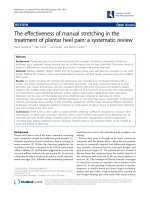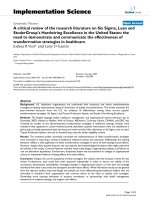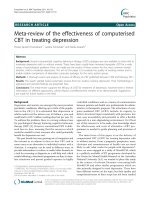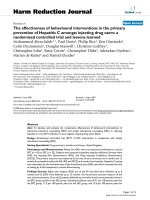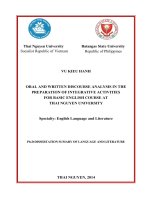THE EFFECTIVENESS OF TRAINING ACTIVITIES IN IMPROVING EMPLOYEES PERFORMANCE AT SAMSUNG
Bạn đang xem bản rút gọn của tài liệu. Xem và tải ngay bản đầy đủ của tài liệu tại đây (322.33 KB, 12 trang )
MINISTRY OF EDUCATION AND TRAINING
HANOI NATIONAL UNIVERSITY
**************
NGUYEN HUU HAU
THE EFFECTIVENESS OF TRAINING ACTIVITIES IN IMPROVING
EMPLOYEES PERFORMANCE AT SAMSUNG DISPLAY VIETNAM’S
QUALITY DEPARTMENT
MAJOR IN: BUSINESS ADMINISTRATION
NO.:
OUTLINE OF MASTER'S THESIS
HA NOI - 2020
MINISTRY OF EDUCATION AND TRAINING
HANOI NATIONAL UNIVERSITY
**************
NGUYEN HUU HAU
THE EFFECTIVENESS OF TRAINING ACTIVITIES IN IMPROVING
EMPLOYEES PERFORMANCE AT SAMSUNG DISPLAY VIETNAM’S
QUALITY DEPARTMENT
MAJOR IN: BUSINESS ADMINISTRATION
NO.:
OUTLINE OF MASTER'S THESIS
SCIENCE INSTRUCTOR
Assoc.Prof.Dr. NGUYEN NGOC THANG
HA NOI - 2020
REASSURANCES
I guarantee that this is my own research project under the instruct of
Assoc.Prof.Dr. Nguyen Ngoc Thang
The data and results stated in the content of the thesis are truthful and have
never been published in any previous research.
H a Noi, on the
day of
, 2020
NGUYEN HUU HAU
ACKNOWLEDGMENTS
I would like to express my deep gratitude to Assoc.Prof.Dr. Nguyen Ngoc Thang
who guided, I am wholeheartedly in the research process to write a dissertation,
imparting new specialized knowledge and valuable experience. treasure in practice.
Sincerely thank Samsung Display Vietnam in general and all staff in the Quality
department in particular for creating favorable conditions and support in terms of
information and data to meet the research objectives of the topic.
I would like to express and acknowledge the support of organizations and
individuals who responded to the interview to provide information in the survey and
interview process.
Thank you to the teachers, learners of the master class for sharing knowledge and
helping me in studying.
Sincerely thanks!
Tp.
Ha Noi, on the
day of
, 2020
NGUYEN HUU HAU
4
1. Introduction
1.1. The urgency of the topic
According to Evans, Pucik & Barsoux (2002, p. 32), organizations are facing
increasing competition due to the changes in the global, technological, political and
economic environment, which has prompted these organizations to train their employees
as one of the ways to prepare them for this growth and improve their performance. It is
important not to ignore the general evidence of knowledge growth in the business
community over the past decade. This growth is not only due to technological
improvements and the combination of production factors, but also has increased efforts to
develop the Organization's human resources. Therefore, in each organization, the
responsibility to improve the performance of employees and undoubtedly implement
training and development is one of the key steps that most companies need to realize.
Obviously, employees are an important resource, and it is important to optimize
employees' contribution to the company's goals and objectives as a means to maintain
effective performance. Therefore, as recommended by Afshan, Sonia, Kamran & Nasir
(2012, p. 646), this requires managers to ensure that sufficient staff with technical and
social skills and career development skills are provided to professional departments or
management positions.
In many cases, the question that may arise is why human resources are
important. Noting that human resources are the intellectual property rights of enterprises,
employees have proved to be a good source of competitive advantages (Houger 2006),
and training is the only way to develop organizational intellectual property rights through
employee capacity-building. In order to succeed, Organizations must effectively acquire
and use human resources. Therefore, organizations need to design their human resources
management in a way that conforms to the organizational structure, because this will
enable organizations to achieve their goals and objectives. In addition, it is important that
organizations support their workforces in acquiring the necessary skills and increasing
commitment.
Samsung Display Vietnam (SDV) is a foreign-invested enterprise in Vietnam.
At SDV, managers focus on developing five core values including: People - Excellence Change - Intergrity - Co- Prosperity. In the five core values mentioned above, PEOPLE is
the value placed on top by SDV. In addition to the great attention and investment in terms
of comprehensive welfare regimes for employees, the company always spends a large
5
amount of money on domestic and foreign training projects, updating public knowledge.
technology, developing skills through which employees have the opportunity to learn,
experience and develop a career in a sustainable way. Currently, SDV is on the rise in
machine technology and automation equipment. Therefore, the demand for the quality of
human resources is increasingly high for specialization, specialized skills, especially
human resources in the quality department, the department responsible for the
management and quality assurance of input materials, paragraphs and output products.
This is a department that SDV's administrators pay special attention to implementing
training programs to improve professional qualifications and specialized skills to ensure
that they can meet the requirements of the job, increase the productivity of employees.
Recognizing the importance and impact of training programs on employees'
performance, the author chose the topic “The effectiveness of training activities in
improving employees performance at Samsung Display Vietnam’s quality
Department” is the subject of my master's thesis to explore the impact and impact of
SDV's training programs and activities on the performance of quality department staff.
From there, propose solutions to contribute to improving the efficiency of training
activities to improve the work efficiency of employees in general and Samsung Display
Vietnam Quality department employees in particular.
1.2 Overview of research
1.2.1 Overseas research situation
According to Otoo (2012), the theme about the Impact of Training and
Development on Accra Institute of Technology Staff Performance. The purpose of the
study is to take Accra Institute of Technology as a case study to investigate whether
training and development affect employee performance. The methodology used for
research is investigation. The main data were collected from a sample of fifty (50) senior
staff. Data were collected by self-management questionnaire for analysis. Research
shows that there are organizational problems such as lack of management support for
training and development programs, thus limiting training and development. It is also
found that training and development have a positive impact on the staff of polytechnics.
The study recommended that in order for Accra Polytechnic to succeed as Africa's
preferred polytechnic, management must authorize all departments to participate in staff
training and development in order to build potential and strengthen staff capabilities.
6
Nassazi (2013) reported that employees are the main asset of any organization.
Their positive contribution to the success of the company cannot be underestimated.
Therefore, it is imperative to equip these unique assets through effective training to
maximize work performance. The purpose of the paper is to assess the impact of training
on employee performance, taking Uganda's telecommunications industry as a case study.
In order to understand the research objectives, four objectives have been formulated.
These objectives focus on determining the existing training programs in the industry, the
training objectives provided, the methods used, and the impact of final training and
development on employee performance. The study is based on three case studies of the
largest telecommunications company operating in Uganda. The qualitative research
method of data collection was adopted, which was composed of 18 questions distributed
to 120 respondents. The results show that training has a significant impact on employees'
work performance.
Neelam Tahir (2017), on the theme is the Impact of Training and Development
on Employee Performance and Productivity: A Case Study of KPK, Pakistan, Peshawar
City, United Bank Limited. The main objective of this article is to investigate whether
training and development will affect employee performance and productivity. This paper
is quantitative. The data of the article are collected through the main sources of
questionnaire survey. The data were tested through statistical software to find out the
impact of training and development on employee performance and productivity. There
are two changes in training and development (independence) and employee performance
and productivity (dependence). Eight limited unified banks were selected for the study.
Eighty questionnaires were distributed to collect data. SPSS descriptive statistical tools
were used to check the reliability and consistency of the questionnaire. The aim is to see
whether training and development have an impact on staff performance and productivity.
The data are analyzed and discussed, and then the results show that there is a significant
relationship between variables.
1.2.2 Domestic research situation
In the study of two authors Nguyen Minh Ha and Le Van Tung (2014) with the
topic "The impact of training on the working efficiency of employees in the textile
industry" used 240 survey samples at textile companies. sewing in Ho Chi Minh City and
using analytical techniques including descriptive statistics, scale reliability test, discovery
analysis (EFA), and linear regression. Exploratory analysis results (EFA) give 5
7
components of training and regression results show that 4 training components have a
positive impact on employee performance in the textile industry, including: training
needs prices, training methods, training content and training evaluation.
Figure Phuong Uyen (2020) has researched on the impact of training on the performance
of cadres, civil servants and public employees in Ben Tre city. The results show that there
are 5 factors affecting the performance of cadres, civil servants and public employees in
Ben Tre city, namely: (1) Training assessment, (2) Needs assessment Training, (3)
Commitment to training, (4) Active training methods and (5) Passive training methods.
1.3 Research objective and question
The main objective of this study is to identify the effects of training activities on
the performance of Quality department staff at SDV.
1.4 Research questions
To achieve the research goals set out. The study poses 04 research questions of the
specific topic as follows:
What training programs are there for SDV’s Quality department staff?
What factors of training activities affect the performance of SDV's Quality
department staff?
What is the impact of training activities on SDV Quality department staff's
performance?
1.5 Research object and scope
1.5.1 Research object
The research object of the topic is the impact of training activities on the
performance of Quality department staff at Samsung Display Vietnam.
1.5.2 Research scope
Space scope: Research was conducted within the Quality department staff at
Samsung Display Vietnam.
Time scope: Secondary data of the study collected over a period of 3 recent years
(from 2017 to 2019).
1.6 Research Methodology
The research uses quantitative research methods, using
analytical
techniques:
descriptive
statistics,
8
EFA
analysis
and
discovery, regression model. The scale of the independent and
dependent variables is designed according to Likert 5, based on
previous studies of studies on the impact of training on employee
performance.
The research data collection tool was the questionnaire. The
questionnaire was distributed to all employees working in the quality
department of Samsung Display Vietnam.
Research sample: According to Bentler & Chou (1987), the
minimum number of observations for one parameter is estimated to be
5. Therefore, when completing the survey questionnaire, based on the
number of questions in the home survey content. The research will
calculate the minimum sample number of the study and conduct a
survey until there are enough samples to be analyzed.
2. The structure of the thesis
In addition to the summary, the references and the topic appendices are divided into six
specific chapters as follows:
CHAPTER 1: INTRODUCTION
1.1 The urgency and reasons to choose the topic
1.2 Research objectives
1.3 Research questions
1.4 Research subject and scope
1.4.1 Research subject
1.4.2 Research scope
1.5 Scientific and practical significance of the topic
CHAPTER 2: LITERATURE REVIEW
2.1 Concept and Definition
2.1.1 Meaning of training
2.1.2 Organization’s Need for Training (Performance)
2.1.3 Aims and Objectives of Training
2.1.4 Training needs Identification and Analysis or Assessment
2.1.5 Training Methods / Techniques
2.1.6 Training Evaluation
2.1.7 Benefits of Trainin
2.2 The components of training impact employee performance
2.2.1 Training Needs Assessment
2.2.2 Training commitments
2.2.3 Training contents
2.2.4 Training methods
2.2.5 Training Evaluation
2.3 Model and hypothesis of the study
CHAPTER 3: RESEARCH MOTHODOLOGY
3.1 Research Design
9
3.2. Building questionnaires and encoding scale
3.3 Methods of sampling and data collection
3.3.1 Methods of collecting primary data
3.3.2 Sample size
3.4 Analyzing data plan
3.4.1 Reliability analysis by Cronbach’s alpha
3.4.2 Exploratory Factor Analysis – EFA
3.4.3 Regression analysis
CHAPTER 4: RESULTS AND DISCUSSION
4.1.Overview about Samsung Display Vietnam
4.2 Data description
4.3 Reliability analysis
4.4 Exploratory factor analysis
4.4.1 EFA test results of the independent variable
4.4.2 EFA test results of the dependent variable
4.5 Regression analysis
4.5.1 Pearson correlation analysis
4.5.2 Verify multivariate linear regression model
4.5.3 Multiple regression equations and conclusions about the hypotheses
CHAPTER 5: CONCLUSION
5.1.Conclusion
5.2 Suggestions
5.3 Limitations and future research direction
REFERENCE
APPENDIX
3. Plan for the research
Activity
Oct
Nov
Dec
Jan/2021 Feb/2021 Mar/2021
Choose topic
Literature review
Design of the study
Collect primary data
Data analysis
Writing research
Talking
with
instructors
4. References
Vietnamese
Nguyen Minh Ha and Le Van Tung (2014). The impact of training on the performance of
employees in the textile industry (Tác động của đào tạo đến hiệu quả làm việc của
nhân viên ngành dệt may). Scientific Journal City Open University. Ho Chi Minh
City - No. 3 (36) 2014
Hinh Phuong Uyen (2020). Impact of training on working efficiency of cadres, civil
servants and public employees in Ben Tre city (Tác động của việc đào tạo đến hiệu
10
quả làm việc của cán bộ, công chức, viên chức trên địa bàn thành phố Bến Tre).
Industry and Trade Magazine.
English
Afshan, S., Sobia, I., Kamran, A. & Nasir, M. 2012. Impact of training on employee
performance: a study of telecommunication sector in Pakistan. Interdisciplinary
Journal of Contemporary Research in Business 4, 6.
Evans, P., Pucik V. & Barsoux J-L 2002. The Global Challenge: Framework
fornInternational Human Resource Management. Boston: McGraw-Hill.
Gerhart, B., Milkovich, G. T., & Murray, B. 1992. Pay, performance, and participation. In
D. Lewin, O. Mitchell, & P. Sherer (Eds.), Research Frontiers in Industrial
Relations, pp. 193-238. Madison, WI: Industrial Relations Research Association.
Ghauri, P. & Grönhaug, K. 2005. Research Methods in Business Studies: A Practical
Guide. 3rd Ed. London: Prentice Hall.
Ghauri, P. N. & Prasad, S. B. 1995. A network approach to probing Asia’s interfirm
linkages. Advances in International Comparative Management 10, 63–77.
Gordon, B. 1992. Are Canadian firms under investing in training? Canadian Business
Economics 1,1, 25–33.
Guest, D. E. 1997. Human resource management and industrial relations. Journal of
Management Studies 24,5, 503–521.
Harrison, R. 2000. Employee Development. Silver Lakes, Pretoria. Beekman Publishing.
Harvey, M. 2002. Human Resource Management in Africa: Alice’s Adventures in
Wonderland. International Journal of Human Resource Management. 13,7, 1119 –
1145.
Nassazi, A. (2013). Effects of training on employee performance
Neelam Tahir (2017). The Impact of Training and Development on Employees
Performance and Productivity A case study of United Bank Limited Peshawar City,
KPK, Pakistan
Otoo, G. (2012). The effect of training and Development on Employee
Performance at Accra Polytechnic.
11


